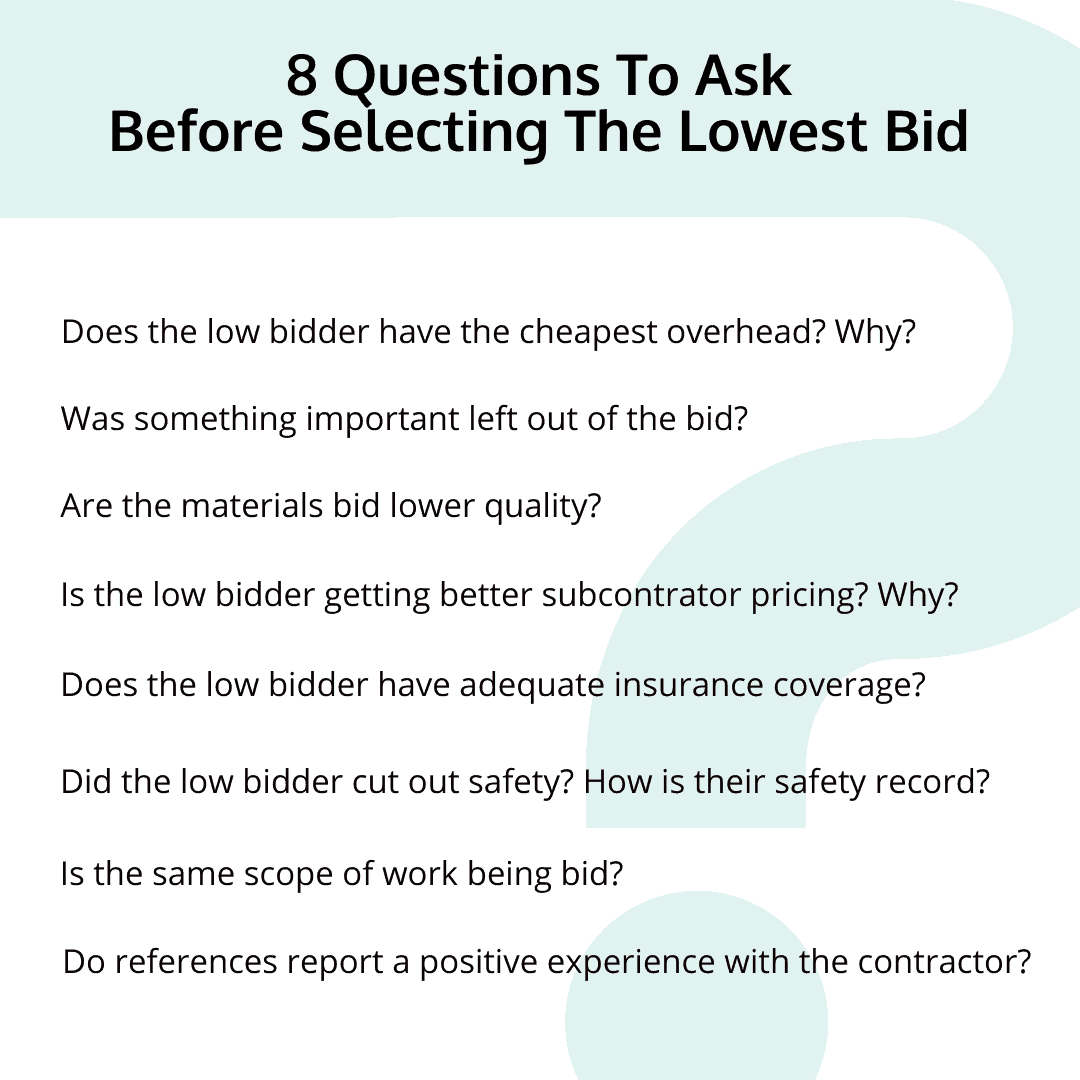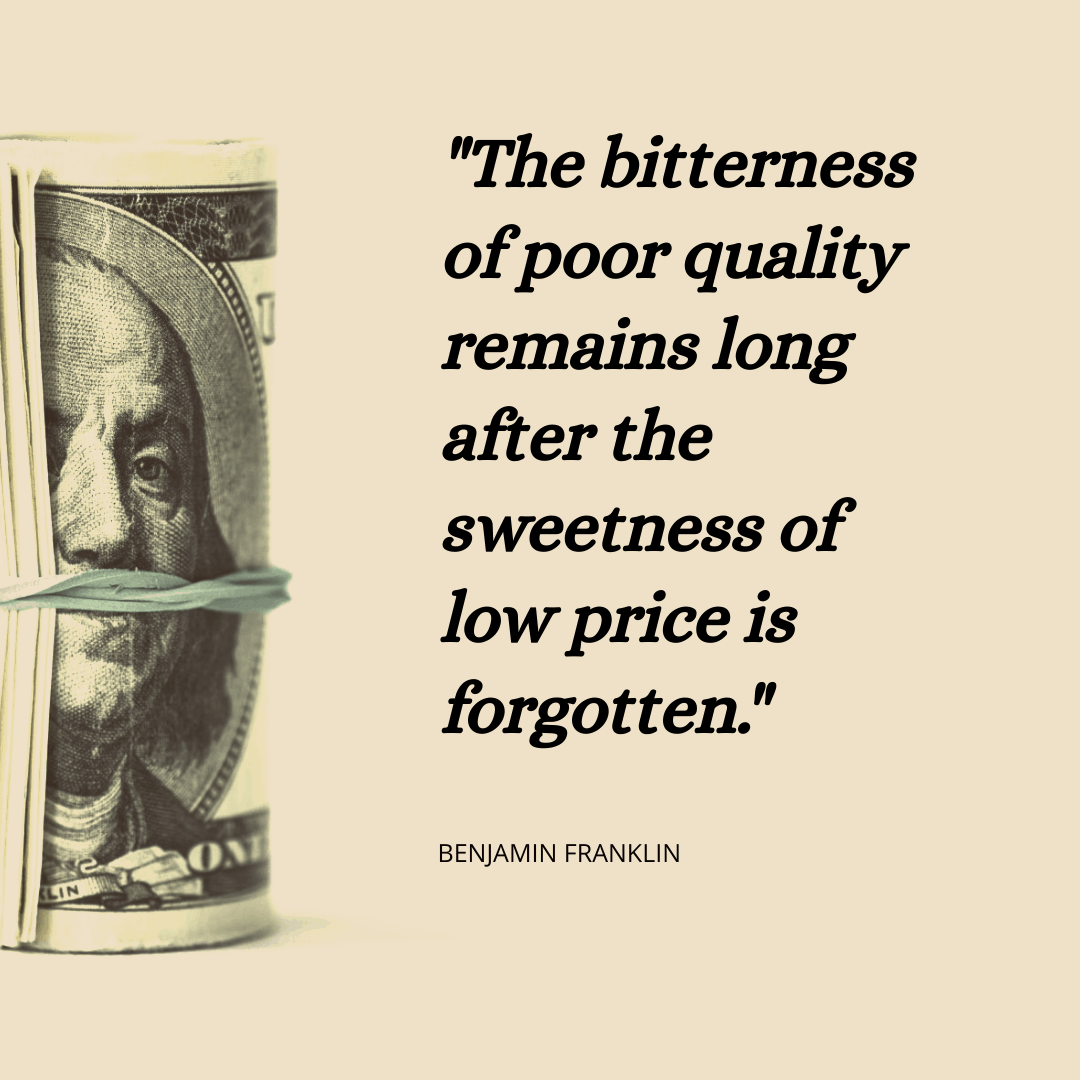
So you’ve gotten several bids for your project, but how can you find the right combination of price, quality, and qualifications? We’ve put together this guide for what to think about when comparing bids in order to select the right general contractor for your commercial construction project.
Background
It’s a common misconception that professional drawings and specifications guarantee that bidders will provide the same results as their competitors, which will subsequently be built to the owner’s expectations. However, detailed and accurate drawings are still only representational at best, and the likelihood that results will vary increases with higher project complexity.
The design-build method gives the advantage of having the contractor’s input during design– the owner and architect don’t have to wait until bidding is complete to know whether their project was designed on, under, or over budget. Design-Build commonly results in the lowest final cost because the GC’s input can help maximize cost-effective design through value engineering.
Why Isn’t the Lowest Bid Always the Best?
A low bid may indicate that not all project costs were taken into account. Low bidders may have overlooked key aspects of your project or cut corners to win the bid and still make sure they don’t lose money on the job. In addition, these low bids can be unrealistic because they probably don’t account for potential problems that may complicate budgeting. Ultimately, there’s nothing about a low bid that indicates the company is the most or least capable (Although some lower-priced contractors may hire illegal or unqualified workers). In fact, some key characteristics of a good GC won’t be indicated by their bid at all. For example, which contractor appears to have the best communication skills? This is something you can’t put a price on! Ultimately, if you select the lowest bid without factoring in anything else, you may get exactly what you paid for.
Good GCs Don’t Compromise on Bids
At Emerald Inc., our comprehensive bids take into account all costs so that there are no surprises later, so it’s no shock that occasionally we’ve been underbid by competitors that don’t do the same. But, we believe in upfront transparency about costs so that clients can be confident that the end price of the project will fall within their budget, all things considered.
“It’s unwise to pay too much, but it’s worse to pay too little. When
you pay too much, you lose a little money – that’s all. When you pay
too little, you sometimes lose everything, because the thing you
bought was incapable of doing the thing it was bought to do.
The common law of business balance prohibits paying a little and getting a
lot – it can’t be done. If you deal with the lowest bidder, it is well
to add something for the risk you run, and if you do that you will
have enough to pay for something better.”
―
Comparing Bids
Only looking at the price and no other bid factors would be like comparing apples to oranges, which isn’t ideal. So, look at all of your bids to identify the other differences. First, are all bidders including the exact same scope of work? Don’t forget to factor in the level of insurance coverage each candidate has. Next, it may be wise to specifically ask how many man hours or the percentage of time the assigned superintendent or project manager will devote to your project. Another great factor to consider and question for GCs is how they will select their subcontractors in order to ensure the highest level of workmanship. Additionally, asking each contractor about the chance of change orders may give you a sense of how likely it is that they will request costs outside of the budget. Then, check their registrar of contractors record. To wrap up, think about the overall value each GC is providing versus the price being offered.


Possible Negative Outcomes of Accepting The Lowest Bid
If a bidder excludes any items to provide a lower price, there will end up being extra work to meet project requirements that were missed or done incorrectly during the pre-construction. In the end, this means the project will likely go both over-schedule and over-budget. Some contractors even intentionally submit a bid for less than it costs to do the work, hoping to try and make money back during the contract. In such a situation, you might expect poor building quality, bad service, disputes, and the contractor’s inability to pay back debts.
The Benefits of A Realistic Bid
The best bids will result in higher quality of work and lower risk. An accurate bid will most likely result in the project staying within budget and schedule. Not only that, but a better bid will probably mean that the GC will meet your needs better and adapt more readily to changes in needs. If you’ve done your homework and determined that the GC has a good track record, you can be confident that paying more means you can depend on the GC to warranty their work and quickly address any issues that may arise after project completion.
Conclusion
Choosing the lowest bid may save you money at the start of a project, but result in a much higher cost in the long-term. Contractors, like Emerald Inc., that depend on their service, performance, reputation, and qualifications (rather than on winning jobs by being the lowest bidder) focus on satisfying their customers in order to secure subsequent work. Email us today or call us at 480-832-9808 to request an accurate, trustworthy bid on your project. We don’t like to lose out on any projects we bid on, but we understand that sometimes you win, sometimes you lose, when bidding commercial construction work. We hope to be able to bid your project and win the job because we guarantee you will be satisfied by our focus on minimizing change orders and providing the highest level of communication and workmanship.

Sources
https://seacoastconstruction.net/why-the-lowest-bid-isnt-always-the-best/
https://aftconstruction.com/why-the-lowest-bid-may-not-be-the-best-choice/
https://wyattmgmt.com/resources/qualifications-based-vs-low-bid-contractor-selection/
https://descco.com/blog/choosing-the-lowest-bid-for-your-construction-project
